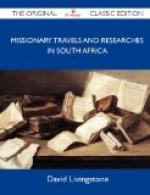The village of old Ionga Panza (lat. 10d 25’ S., long. 20d 15’ E.) is small, and embowered in lofty evergreen trees, which were hung around with fine festoons of creepers. He sent us food immediately, and soon afterward a goat, which was considered a handsome gift, there being but few domestic animals, though the country is well adapted for them. I suspect this, like the country of Shinte and Katema, must have been a tsetse district, and only recently rendered capable of supporting other domestic animals besides the goat, by the destruction of the game through the extensive introduction of fire-arms. We might all have been as ignorant of the existence of this insect plague as the Portuguese, had it not been for the numerous migrations of pastoral tribes which took place in the south in consequence of Zulu irruptions.
During these exciting scenes I always forgot my fever, but a terrible sense of sinking came back with the feeling of safety. The same demand of payment for leave to pass was made on the 20th by old Ionga Panza as by the other Chiboque. I offered the shell presented by Shinte, but Ionga Panza said he was too old for ornaments. We might have succeeded very well with him, for he was by no means unreasonable, and had but a very small village of supporters; but our two guides from Kangenke complicated our difficulties by sending for a body of Bangala traders, with a view to force us to sell the tusks of Sekeletu, and pay them with the price. We offered to pay them handsomely if they would perform their promise of guiding us to Cassange, but they knew no more of the paths than we did; and my men had paid them repeatedly, and tried to get rid of them, but could not. They now joined with our enemies, and so did the traders. Two guns and some beads belonging to the latter were standing in our encampment, and the guides seized them and ran off. As my men knew that we should be called upon to replace them, they gave chase, and when the guides saw that they would be caught, they threw down




